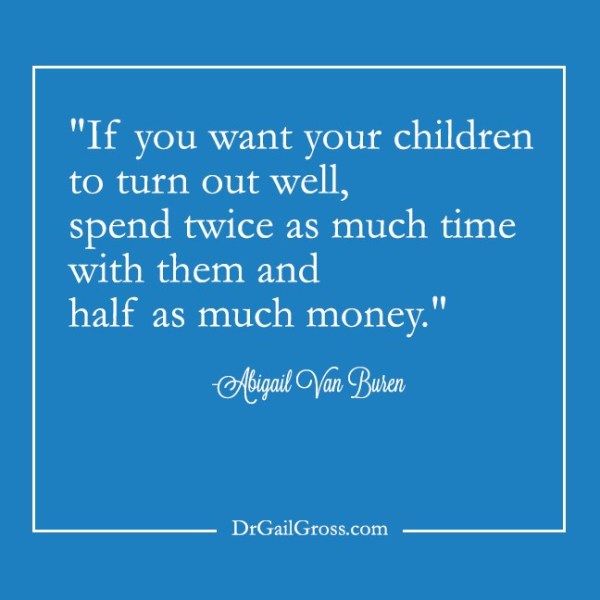
The saying goes: “It takes a village to raise a child.” Former First Lady and Secretary of State Hillary Rodham Clinton popularized the phrase with her book, It Takes a Village. In it, she frames the argument that we live in such a busy world – with more parents working, more societal pressures, greater general expectations for our kids — that it takes the collective effort of parents, teachers, neighbors, community members to raise our children.
I get that. I understand her point, because as a working parent, I’ve been there. However, while “the village” is an important influence on a child’s life, I think it underscores the important truth that I’ve seen over and over again as a human behavior expert with a Ph.D. in Psychology and a Doctorate of Education: that in the end, parents are THE most influential factor in child development. Period.
At the end of the day, it takes a family to raise a smarter, less stressed child, not a village.
There are many wonderful different combinations that make up families these days. Regardless of your family makeup, it is the bonds that are formed between you, the parent, and your child, that have the greatest impact on your child’s health, cognitive development, language learning, self-esteem, and overall academic performance.
Parental involvement influences cognitive development
There is a link between parental involvement in the early years and cognitive development — how children learn to think and understand the world around them. Florence Goodenough suggests in her book, The Handbook of Child Psychology, that strong evidence indicates environmental factors, including home influence, accounts for between 20% and 40% of a person’s IQ, which she takes to be a measure of cognitive development. Children rely on parental interaction to guide their understanding of their social, intellectual, and physical capabilities.
For example, when you give your toddler room to roam within a safe, confined environment in which you have removed potential harm, you are giving them monitored, yet free, play time in which they learn how to interact and explore with the world around them. How you react to their activity during this time teaches them a lot about appropriate and inappropriate behavior. Knowing that you are there close by also helps build a sense of security within that allows them to extend out and experiment more with their environment, thus giving them greater learning opportunities. As a result, cognitive and social development is directly connected to the interaction between parent and child.
Early childhood is a critical time for child development: it is both the period when half of cognitive development is taking place and also the parent-child relationship is being formed. This is a time when you have the potential to make the greatest impact, and there are countless ways you can do so that don’t take a lot of time or money.
Parental involvement influences language Learning
Parental involvement in the learning process is so powerful that even the manner in which a parent speaks to his/her child can affect their child’s cognitive development.
Studies have concluded that the home environment, especially verbal interaction at home, plays a major role in language acquisition, development, and reading readiness. In fact, complex language, rather than short, simple sentences, appears to be more effective in helping with reading achievement and building associative mass which impacts IQ. 1
For example: instead of saying to your toddler “Wash hands now,” you might say, “Now that we’re done with lunch, it’s time to wash our hands in the sink with soap and water.”
Parental involvement can help reduce childhood stress and improve academic performance
In my many years of working with children as a researcher and educator, I have witnessed the power of stress reduction in children’s lives. Regardless of where children live, how much money their family does or does not have, whether both parents work outside of the home, or whether they are raised in a single parent household – parents/guardians can do a great deal to help reduce stress in their child’s life, which opens the door to greater health, sense of self, and learning opportunities.
Landmark studies I conducted within the Houston Independent School District looked at stress reduction techniques that can help improve academic performance. When children are given the tools to learn how to self-manage stress, their brains have the opportunity to open to maximum potential, and therefore they have a greater chance of doing better in school. My program has since been implemented in schools throughout the country, and I have also developed audio meditations that parents can download and do with their children to help reduce stress and enhance creativity and learning.

The village is important, but parental involvement is the #1 key
The village is, indeed, an important influential factor in the life of a child. I do not mean in any way to discount outside influences on the cognitive development, social function, and academic performance of children. I am simply saying that in the end, we cannot forget that the single greatest influence on your child’s development is still you, the parent.
You are the key to boosting your child’s health, self-esteem, and even IQ. By redefining quality family time in an over-scheduled society, we can help reduce stress in our children, and help give them the tools they need to grow mentally, emotionally, and academically. For more ideas on how to do so, download my free Seven Simple Solutions parenting tips workbook.
Be there for your child, and with your child. In just 20 short minutes a day, you can make a huge difference in your child’s life. Remember: it takes a family to raise a child, not a village; it takes YOU.
1 Effects of Parenting and Home Improvement on Student Achievement in Grades 3 to 5, P.L. Gunter

